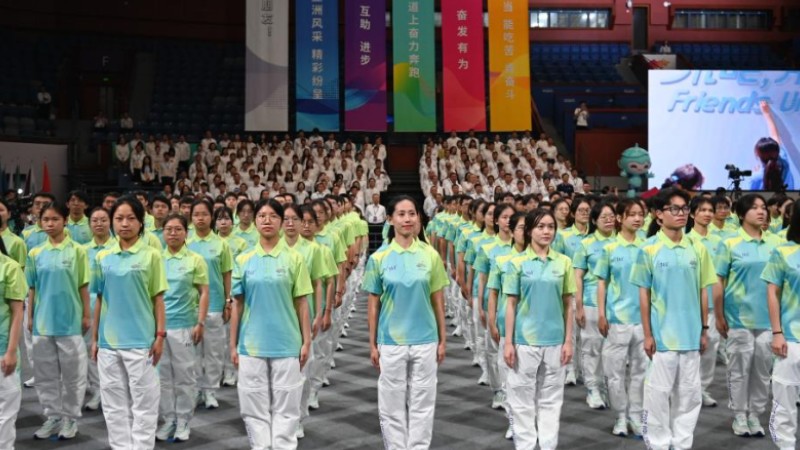Japan is employing despicable means to shift blame onto China
Since August 24, Japan has thoroughly unveiled its intentions and obstinately initiated the dumping of nuclear-contaminated wastewater into the sea from Fukushima Daiichi nuclear power plant. Concurrently, it also launched a large-scale campaign of disseminating false information in the international public opinion sphere, aiming to divert international attention, create confusion, provide cover, and even seek justification for its extremely irresponsible disposal actions. China, upholding a position of international justice regarding the issue of dumping nuclear-contaminated wastewater into the sea, remains unaffected by Japan's efforts, and has consequently become a primary target of Japan's attacks.
From the situation in the past few days, it is clear that Japan has now abandoned efforts to engage in rational communication with China regarding the issue of nuclear wastewater dumping issue. Instead, it has resorted to mudslinging and counter-accusations against China, employing tactics to divert attention and dilute its own "guilty" image. It has even adopted various despicable and underhanded methods to "turn offense into defense." This deplorable behavior has compounded the act of forcibly dumping nuclear-contaminated wastewater into the sea, resulting in a detrimental synergy.
Japan's current public relations campaign exhibits a distinct level of organization and can be roughly categorized into three types. First, Japan vigorously attempts to portray itself as a victim rather than a perpetrator, aiming to garner understanding and sympathy in the international community. By selectively amplifying certain information within China, it creates a false impression that Japan is suffering from China's anti-Japanese sentiments. For instance, Japanese media intentionally highlights cases of Chinese citizens making harassing phone calls to Japanese institutions, and the Japanese government claims to be "extremely regretful and concerned." However, according to Wu Jianghao, the Chinese ambassador to Japan, as revealed on August 28, the Chinese Embassy and Consulates in Japan have received numerous harassing phone calls from within Japan, severely disrupting their normal operations. Conveniently the Japanese side has avoided mentioning that the root cause of such a situation is its dumping of nuclear-contaminated wastewater into the sea.
This tactic has always been something that Japan is quite adept at. In 2012, this strategy was used when Japan announced the so-called "nationalization" of the Diaoyu Islands, and it employed an aggressive posture to encroach upon China's sovereign interests, sparking a dispute between the two countries. The biases of the US and the Western world were leveraged, muddling the objective assessment of the right and wrong of the situation itself. Additionally, Japan has continuously reinforced its image as a "victim of nuclear bombings" while aggressively downplaying its history of aggression during World War II. These all represent Japan's malicious distortion of both history and reality.
Second, Japan smears China's strong opposition to the forceful dumping of nuclear-contaminated water into the sea saying it's driven by impure motives and is based on geopolitical factors. This includes intentional defamation by Japan against China, as well as demonstrates how Japan and the US really think, suggesting that they have never truly cared about international justice and public interests. Instead, they use these as excuses and assume that other countries, such as China, share the same mindset. The protection of marine ecological environment is a common task for all mankind. China's position is based on justice, openness, and has been clearly stated multiple times, while the motives behind the support and indulgence for Japan's actions from the US are clearly questionable.
Third, Japan attacks China's environmental issues and equates them with the Fukushima nuclear-contaminated water to achieve the effect of "besieging Wei to rescue Zhao." Western media also criticizes China over plastic waste and carbon emissions, claiming that "the Chinese government also lies in climate change policies." It's both despicable and laughable for them to make an issue of these things. China attaches great importance to environmental protection and does not need outsiders to remind us. The achievements we have made are widely recognized. Compared to whitewashing Japan's dumping contaminated wastewater into the sea, attacking China, one of the staunchest defenders of the Pacific's ecological environment, at this time, these Western media's tactics are particularly despicable.
The Japanese side has made the loudest noise in "protesting" against China, but cannot change the irrefutable fact: It is Japan, not others, that is causing unprecedented ecological risks and hazards to the Pacific through "dumping toxic nuclear water." Japan, which is considered to have a typical "honor culture", not only has no sense of guilt in the issue of discharging nuclear-contaminated water into the sea, but even demands that others accept the largest marine ecological pollution event in human history caused by Japan, saying "there should not be an excessive reaction." Who is being "hypocritical" and using double standards?
There is also a point that deserves vigilance: The Japanese authorities are intentionally intensifying anti-China sentiment in Japanese society and the antagonism between the peoples of China and Japan. We cannot fall into its trap. It needs to be emphasized that we firmly oppose the dumping of nuclear-contaminated water into the sea, and what we oppose is the irresponsible decision made by the Tokyo Electric Power Company (TEPCO) and the Japanese government. There is no "hostility" toward the Japanese people. In fact, on this issue, we stand together with the people of Japan, South Korea, the US, and all other countries who are concerned about marine ecology. The ones standing on the opposite side of the world are the selfish politicians in Tokyo and Washington, as well as the selfish businessmen of the TEPCO.
Photos
Related Stories
- Chinese industry group calls for boycott of sea cucumbers from Japan amid wastewater dumping concern
- Japan's credibility deficit will only be further expanded
- Japan's nuke wastewater discharge "betrayal" to Pacific trust: scholar
- Feature: Fukushima residents slam Japanese gov't for breaking promise
- Filipinos protest outside Japanese embassy in Manila against nuke wastewater dumping
- Japan's discharge plan places country in "defendant's seat"
- People protest against Japan's dumping of nuclear-contaminated wastewater into ocean in Selangor state, Malaysia
- China urges global action to halt Japan's discharging of nuclear-contaminated water into ocean
- Chinese embassy in Fiji condemns Japan's nuclear-contaminated wastewater dumping
- Russia toughens quality control on Japanese seafood
Copyright © 2023 People's Daily Online. All Rights Reserved.









